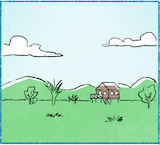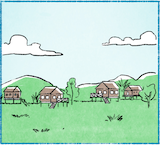


อันนี้คืออี่หยัง อันนี้กะเป็นทัมมะซาด เป็นทุ่งหญ้า หลือป่าหญ้านั้นหละ
มีบ้านพ้อมบ่ มีอยู่ ในป่านี้กะสิมีบ้านหลังหนึ่ง เป็นบ้านไม้ มีบ้านหลังเดียวข้อหล้อ
แล้วมันมีพูเขาพ้อมบ่ กะมีอยู่ มีพูเขาพ้อม มีพูเขาหลายลูก หลือมีพูเขาหลายหม้องนั้นหละ
มีพูเขาใหญ่ มีพูเขาน้อย มีหลายคัก มีหลายอี่หลี
แล้วมีต้นไม้พ้อมแม่นบ่ แม่น มีต้นไม้พ้อม ต้นไม้กะหลายต้นอยู่ หลายต้นคัก
แล้วอยู่เทิงฟ้ากะมีก้อนเมกพ้อม มีก้อนเมก มีขี้ฝ้าลอยโอ่งโล่งๆ อยู่เทิงท้องฟ้านั้นหละ มีขี้ฝ้าหลายเติบ มีก้อนเมกหลายเติบ
16
นี้คืออี่หยัง อันนี้กะเป็นหมู่บ้าน เป็นหมู่บ้านหลายหลัง มีหมู่บ้านหลายหลัง หลือสี่หลังนั้นหละ หลือเฮากะแนมบ่เห็น อาดสิมีหลายกว่านั้นกะได้
เป็นบ้านไม้เทิงเบิด บ้านค้ายๆ กัน ลักสะนะคือๆ กัน ค้ายๆ กันนั้นหละ บ่แตกต่างจากกันคัก เบิ่งซงแล้วเป็นลักสะนะคือกัน
หมู่บ้านคืออี่หยัง หมู่บ้านกะคือหม้องที่อยู่อาสัยของคน เป็นหมู่บ้าน หลือเป็นจุดๆ ที่คนอาสัยอยู่หั้น ที่คนสามาดส้างบ้านอยู่หั้น หลือลวมกันหลายๆ คน หลือลวมกันหลายๆ หลัง เขากะสิเอิ้นหมู่บ้าน
17
อันนี้คืออี่หยัง อันนี้เป็นเมียง หลือเป็นเมียงหลวงนั้นหละ หลือเป็นเมียงใหญ่ๆ
เมียงนี้กะมีตึก มีตึก มีหญัง มีหอ มีหญังหลายอย่าง ที่เป็นก่อส้างจากตึก ที่เป็นก่อส้างจากอิด หลือก่อส้างจากปูน ที่บ่ได้เฮ็ดจากไม้ หลือที่บ่มีทัมมะซาด ก่อส้างจากปูน ที่แตกต่างจากทุ่งนา ทุ่งไฮ่ ทุ่งหญ้า ทุ่งไหล้
เขากะสิเอิ้นว่าเป็นเมียง ที่มีความจะเลิน ที่แตกต่างจากบ้านนอก หลือจากไฮ่จากนาเฮา
แล้วในเมียงคนหลายบ่ กะหลายอยู่ ในเมียงคนกะหลายคัก หลายคักอี่หลี คนกะมาแออัด มาอาสัยอยู่ในเมียงหลวง หลือในเมียงเมียงนั้น
เพาะว่ามันมีความจะเลิน คนกะอยากมาหม้องที่มันมีความจะเลิน บ่อยากอยู่บ้านนอก บ่อยากอาสัยอยู่บ้านนอก กะอยากอยู่ในเมียง บ่อยากอยู่บ้านนอก อยากมาอยู่ในเมียง อยากอยู่ในความจะเลิน
Link to overview page
Link to dictionary
| Isaan | Pronunciation | Tones | Thai | English/Notes |
|---|---|---|---|---|
| อัน | an | M | อัน | 1. thing, object 2. general clf. for objects |
| นี้ | ni: | HF | นี้ | 1. this 2. here |
| คือ | khʉ: | HR | คือ | 1. to be, to resemble, like, as 2. why {บักหล้าคือบ่เก็บโต่ะแน่ = [addressing a young boy] Why haven't you cleared the table?} |
| อี่หยัง | i:-yaŋ | H-M | อะไร | 1. what {นี้คืออี่หยัง = What is this?} {มื้อนี้เจ้าเฮ็ดอี่หยัง = What are you doing today?} {กินเข้างายกับอี่หยัง = What did you have for breakfast?} 2. something, anything, (in negations) nothing {บ่ต้องเฮ็ดอี่หยังอีกเลยนอกจากใส่ปุย = [we] don't need to do anything besides adding fertilizer} |
| กะ | ga | M | ก็ | 1. then, consequently 2. also |
| เป็น | pen | M | เป็น | 1. to be, to exist 2. to be able to 3. to suffer, sth. happens to 4. เป็นหญัง[...]คือ in initial position: why? {เป็นหญังเขากะคือแปงฟัน = Why is he brushing his teeth?} {เป็นหญังเคี่ยงบินมันคือสิตก = Why is the airplane falling down?} |
| ทัมมะซาด | tham-ma-sa:t | HR-H-HF | ธรรมชาติ | nature Notes: pronunciation: also realized as ทัมมะชาด |
| ทุ่ง | thuŋ | H | ทุ่ง | field, pasture {ทุ่งนา = rice field} |
| หญ้า | ɲa: | LF | หญ้า | grass |
| หลือ | lʉ: | M | หรือ | or |
| ป่า | pa: | H | ป่า | forest |
| นั้นหละ | nan-la | HF-M | นั่นแหละ | auxiliary for emphasis at the end of a phrase |
| มี | mi: | HR | มี | 1. to have 2. there is |
| บ้าน | ba:n | HF | บ้าน | 1. house, home 2. village (also used as a prefix before the name of a village) 3. home country, home region {บ้านเฮาเฮ็ดเข้าจั่งใด = How do we plant rice in Isaan/Thailand?} |
| พ้อม | phɔ:m | HF | พร้อม | at the same time, also, too {มีตะเว็นพ้อม = the sun's out, too} {กะทะมีด้ามพ้อม = the pan has also a handle} |
| บ่ | bɔ: | H | ไม่ | 1. no, not 2. question particle, transforming a statement into a question Notes: spelling exception in line with common usage on social media |
| อยู่ | yu: | H | อยู่ | 1. to be (located) at 2. yet, still 3. auxiliary indicating continuous or progressive action {ทอดปาอยู่ในกะทะ = (in the process of) frying a fish in the pan} {แม่กำลังเมี้ยนเฮียนอยู่ = mother is cleaning/tidying up the house} |
| ใน | nai | HR | ใน | in, within |
| สิ | si | M | จะ | future tense auxiliary {เขากำลังสิตื่น = he's about to wake up} {สิไปตะหลาด = [I'm] going to the market} |
| หลัง | laŋ | M | หลัง | 1. back, after 2. back (of body) {ขี่หลังควย = to ride on a water buffalo} 3. clf. for houses {บ้านหลังใหญ่ = a large house} {เฮียนไม้หลังเก่า = an old wooden house} |
| หนึ่ง | nʉŋ | H | หนึ่ง | 1. one 2. after adjective: intensifier {บักคักหนึ่ง = very much} {อันบักใหญ่หนึ่ง = very large}, or attenuates the meaning {กะดาดมันแผ่นน้อยๆ หนึ่ง = the piece of paper is [relatively] small} |
| ไม้ | mai | HF | ไม้ | wood, tree |
| เดียว | di:ao | M | เดียว | only, alone, single |
| ข้อหล้อ | khɔ:-lɔ: | LF-LF | เท่านั้น, ขนาดนั้น, น้อยๆ | only {ต้นไม้มีต้นเดียว ต้นเดียวข้อหล้อ = there's one tree, only one tree} {มีบ้านหลังเดียวข้อหล้อ = there's only one house} |
| แล้ว | lɛ:o | HF | แล้ว | 1. finished 2. already 3. and then, and next (especially แล้วกะ) 4. auxiliary for past tense |
| มัน | man | HR | มัน | it (also used to refer to people) |
| พูเขา | phu:-khao | HR-M | ภูเขา | mountain |
| หลาย | la:i | M | เยอะ, มาก | many, much, very |
| ลูก | lu:k | HF | ลูก | 1. child 2. clf. for balls, fruits (lime), mountains |
| หม้อง | mɔŋ | LF | ที่, แห่ง, บริเวณ | 1. place, area {หลายที่หลายหม้อง = in many places} {หม้องใดหม้องหนึ่ง = some place} 2. clf. for places |
| ใหญ่ | ɲai | H | ใหญ่ | large, big |
| น้อย | nɔ:i | HF | น้อย | 1. few, little 2. small |
| คัก | khak | H | intensifier: very, very much | |
| อี่หลี | i:-li: | H-M | จริง | intensifier: really Notes: pronunciation: also realized as อี่หลิ |
| ต้นไม้ | ton-mai | HF-HF | ต้นไม้ | tree |
| แม่นบ่ | mɛ:n-bɔ: | H-H | ใช่ไหม | question particle: ..., right? ..., isn't it? ..., don't you? etc. {เจ้าได้เห็นสิ่งนั้นแม่นบ่ = You've seen that, haven't you?} {ฝนกำลังตกแม่นบ่ = It's raining, isn't it?} {นี้คือกะคุแม่นบ่ = This is a bucket, isn't it?} |
| แม่น | mɛ:n | H | ใช่ | 1. yes 2. affirmative particle |
| ต้น | ton | HF | ต้น | 1. clf. for trees, plants, logs/pieces of wood {ต้นไม้ต้นใหญ่ = a large tree} {ต้นฟืน = log/piece of wood} 2. first, primary, initial {ลูกคนต้นหมู่ = first child} |
| เทิง | thə:ŋ | HR | บน | 1. on, on top of, at, in {เทิงโต่ะ = at/on the table} {กบมันนั่งอยู่เทิงใบบัว = the frog is sitting on the lotus leaf} {เทิงท้องฟ้า = in the sky} {มันแล่นอยู่เทิงลาง = [the train] runs on rails} {มีคนนั่งอยู่เทิงลดสามล้อสามคน = there are three people sitting in the tuk tuk} 2. up, upward Notes: pronunciation: also realized as ทัง |
| ฟ้า | fa: | HF | ฟ้า | 1. sky {เคี่ยงบินมันกำลังบินขึ้นฟ้า = the airplane is taking off into the sky} 2. color: blue |
| ก้อนเมก | gɔ:n-me:k | HF-HF | ก้อนเมฆ | cloud Notes: see also ขี้ฝ้า |
| ขี้ฝ้า | khi:-fa: | LF-LF | เมฆ | cloud {ขี้ฝ้ามีหลายอยู่ ขี้ฝ้ามันมีเต็มท้องฟ้าอยู่ = there are many clouds, there are clouds all over the sky} |
| ลอย | lɔ:i | HR | ลอย | 1. to float, to swim 2. to soar 3. smoke/steam: to rise |
| โอ่งโล่ง | o:ŋ-lo:ŋ | H-H | ลอยอยู่ | floating |
| ท้องฟ้า | thɔ:ŋ-fa: | HF-HF | ท้องฟ้า | sky |
| หลายเติบ | la:i-tə:p | M-LF | many, much, very (more intense than หลาย) | |
| หมู่บ้าน | mu:-ba:n | H-HF | หมู่บ้าน | village |
| สี่ | si: | H | สี่ | four |
| เฮา | hao | HR | เรา | 1. personal pronoun: we 2. personal pronoun: I |
| แนม | nɛ:m | HR | มอง | to look, to glance, to stare {เขากำลังยืนแนมก้อนหินอยู่ = he's standing and looking at the stone/rock} {ข้างหนึ่งแนมเห็น อีกข้างหนึ่งแนมบ่เห็น = [we] see one side, [we] can't/don't see the other side} |
| เห็น | hen | M | เห็น | to see |
| อาด | a:t | LF | อาจ | 1. might, may, will 2. likely |
| กว่า | gwa: | H | กว่า | more, more than, comparative: as, than |
| นั้น | nan | HF | นั้น | that, there |
| ได้ | dai | HF | ได้ | 1. can 2. to get, to obtain 3. before verb: indicating past tense 4. บ่ได้ + verb: not |
| เทิงเบิด | thə:ŋ-bət | HR-M | ทั้งหมด | all, all of them, in total {มีลูกเทิงเบิดสามคน = there are three children in total} {เขาเป็นพุหญิงเทิงเบิด = they are all girls} Notes: pronunciation: also realized as ทังเบิด |
| ค้าย | kha:i | HF | คล้าย | to resemble, to be similar, to be alike {ทัพพีเป็นค้ายๆ กับซ้อน = a ladle is similar to a spoon} |
| กัน | gan | M | กัน | mutual, each other, with another, together {เขากำลังนั่งเว้ากัน = they're sitting and talking} {เขาสองคนฮักกัน = they love each other} {ปาสองโตนี้ ใหญ่ห่างกันหลายบ่ = These two fish here, are they very different in size (from each other)?} {ต่างกัน = to be different (from each other)} {ก่องอันไหนหนักกว่ากัน = Which box is heavier (than the other(s))?} |
| ลักสะนะ | lak-sa-na | H-M-H | ลักษณะ | feature, characteristic, quality |
| แตกต่าง | tɛ:k-ta:ŋ | LF-H | แตกต่าง | different, dissimilar |
| จาก | ja:k | LF | จาก | 1. from {... เฮ็ดมาจากอี่หยัง = ... is made from what?} 2. to depart |
| เบิ่ง | bəŋ | H | ดู | 1. to look at, to see, to watch {เบิ่งโทละทัด = to watch TV} {เบิ่งหนัง = to watch a movie} 2. to guess {เบิ่งซงแล้ว ... = [I] guess / from what it looks like ...} |
| ซง | soŋ | HR | ทรง | 1. shape, form 2. as if, like Notes: translation to be confirmed |
| คือกัน | khʉ:-gan | HR-M | เหมือนกัน | 1. also, likewise, similarly {ยินดีที่ได้ฮู้จักคือกันคับ = Nice to meet you too!} 2. in negative sentences: either {บ่ลู้คือกัน = I don't know either} {จักคือกัน = I don't know (either)} |
| ที่อยู่อาสัย | thi:-yu:-a:-sai | H-H-M-M | ที่อยู่อาศัย | place of residence, dwelling |
| ของ | khɔ:ŋ | M | ของ | of, belonging to |
| คน | khon | HR | คน | person, people |
| จุด | jut | M | จุด | 1. to light sth. {จุดธูป = to light an incense stick} {จุดเทียน = to light a candle} 2. point, place {จุดเป้าหมาย = destination (e.g., of a trip)} |
| ที่ | thi: | H | ที่ | 1. that, which {คนที่ยืนอยู่ฝั่งขวา = the person which is standing on the right = the person standing on the right} {เว้าคำที่บ่สุพาบ = to speak words which are impolite = to speak impolitely} 2. for ordinal numbers {ที่สาม = third} |
| อาสัย | a:-sai | M-M | อาศัย | 1. to live, to reside, to settle {ซ้างมันอาสัยอยู่ใส = Where do elephants live?} 2. to use |
| หั้น | han | LF | ที่นั่น | there, over there |
| สามาด | sa:-ma:t | M-HF | สามารถ | can, to be able |
| ส้าง | sa:ŋ | LF | สร้าง | to build {ส้างบ้านส้างเฮียน = to build a house} |
| ลวม | lu:am | HR | รวม | 1. total {ลวมแล้วเป็นแปดขาพอดี = in total, these are eight legs} 2. to assemble, to combine, to join {เอากะดาดหลายแผ่นมาลวมกัน = to put many pieces of paper together} Notes: see also ฮวม(กัน) |
| เขา | khao | M | เขา | personal pronoun: he, she |
| เอิ้น | ə:n | HF | พูด, เรียก | to call, to say {เอิ้นง่ายๆ ว่า = in other words} {คนอี่สานเอิ้นว่า เป็นลูกคนกก = Isaan people call her ลูกคนกก} |
| เมียง | mi:aŋ | HR | เมือง | town |
| เมียงหลวง | mi:aŋ-lu:aŋ | HR-M | เมืองหลวง | capital city |
| ตึก | tʉk | M | ตึก | building |
| หญัง | ɲaŋ | M | อะไร, เป็นหญัง = ทำไม | 1. what {เขากำลังเฮ็ดหญัง = What is he doing?} {ธูปเอาไว้เฮ็ดหญัง = What are incense sticks for?} 2. something, anything, (nothing) 3. เป็นหญัง[...]คือ in initial position: why {เป็นหญังเขาคือใส่บักพิกลงไปในกวยเตียว = Why is he putting chili in [his] noodle soup?} {เป็นหญังหน้าต่างมันคือเปิด = Why is the window open?} {เป็นหญังมันคือมีควนไฟ = Why is there smoke?} |
| หอ | hɔ: | M | หอ | dormitory, building with a special purpose |
| อย่าง | ya:ŋ | H | อย่าง | type, kind, sort, category |
| ก่อส้าง | gɔ:-sa:ŋ | H-LF | ก่อสร้าง | to construct, to build |
| อิด | it | M | อิฐ | brick |
| ปูน | pu:n | M | ปูน | cement {บ้านปูน = house with stone walls, as opposed to บ้านไม้} |
| เฮ็ด | het | H | ทำ | to do, to make |
| นา | na: | HR | นา | rice field |
| ไฮ่ | hai | H | ไร่ | plantation, field (for crops other than cereal) {ไฮ่นา = general term for fields, including rice fields} |
| ไหล้ | lai | LF | used in semantic reduplications {ทุ่งหญ้าทุ่งไหล้ = grass meadows [and such]} {ป่าไม้ป่าไหล้ = forests [and such]} | |
| ว่า | wa: | H | ว่า | 1. that, as {คำว่า X = the word X} 2. to say |
| ความ | khwa:m | HR | ความ | 1. prefix: state, condition, quality 2. content, subject, matter, affair |
| จะเลิน | ja-lə:n | M-HR | เจริญ | to develop, to progress, to prosper |
| บ้านนอก | ba:n-nɔ:k | HF-HF | บ้านนอก | countryside |
| มา | ma: | HR | มา | 1. to come 2. auxiliary expressing action towards the present or focal time {กะคุเฮ็ดมาจากอี่หยัง = What is the bucket made of?} {แล้วเขากะเก็บเงินจากพุนั้นมา = and then she takes the money of that person} |
| แออัด | ɛ:-at | M-M | แออัด | congested, crowded |
| เพาะว่า | phɔ-wa: | H-H | เพราะว่า | because |
| อยาก | ya:k | LF | อยาก | to want, to wish |